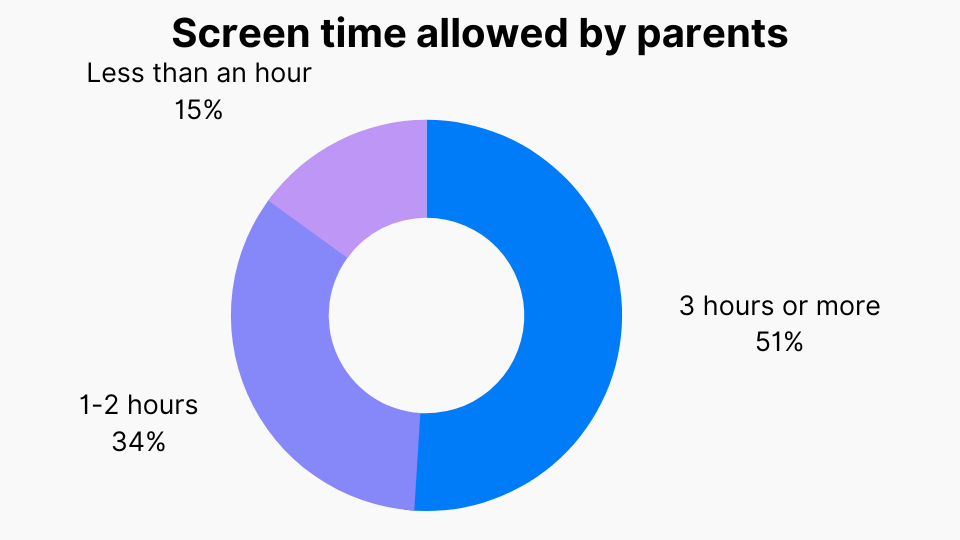The average screen time for teens is around 6 hours and 59 minutes every day.
Learn about:
- What are the screen time recommendations for kids and teenagers
- How much time do adolescents spend on their phones and in front of the TV
- How did the pandemic influence screen time in adolescents
Are you curious to know what age group has the highest screen time?
More on that in the article below.

What’s the average screen time for teenagers
What’s the average screen time for kids
What’s the recommended screen time by age
How much time does an average teenager spend on social media
How much time does an average teenager spend on phone
How much time do kids spend watching TV
Worrying Kids and Teen Screen Time Statistics
- The recommended daily screen time is 2 hours, with children under 18 months having no screen time at all.
- On average, adolescents spend 6 hours and 59 minutes per day in front of the screen.
- 51% of American kids are allowed to have a daily screen time higher than 3 hours.
- During the pandemic, 51% of adolescents admit to watching more online video content than before.
- The average teenager (between 13 to 18 years) spends 8 hours and 39 minutes on his phone every day.
What’s the average screen time for teenagers?

US teenagers between 11 to 14 years old spend 9 hours in front of the screen daily.
The table shows the average screen time by age:
| Age group | Average daily teenager screen time |
|---|---|
| 8-10 years | 6 hours |
| 11-14 years | 9 hours |
| 15-18 years | 7.5 hours |
With little more than 9 hours, teen boys spend more time in front of the screens than girls at 8 hours per day.
Here’s a more accurate table of daily screen time based on gender:
| Average daily teen screen time, by gender | Boys | Girls |
|---|---|---|
| 2021 | 9 hours 16 minutes | 8 hours 2 minutes |
| 2019 | 7 hours 36 minutes | 7 hours 7 minutes |
What’s the average screen time for kids?
Kids between 0 to 8 years old have 2.5 hours of screen time per day on average.
Between ages 8-10, US kids spend 6 hours a day in front of a screen.

(Source: CDC)
Adults aren’t much better; here are the general screen time stats.
More concerning is the data on toddlers, where only 1-year-olds spend 53 minutes on average looking at the screen daily.
Two-year-olds and below had an average of 49 minutes of screen time, whereas kids between 2-4 years averaged 2.5 hours per day.
3-year-olds have around 150 minutes of daily screen time, and the ones between 5-8 years had 3+ hours on average.
Interestingly, the kids between 7-8 years had only 90 minutes of daily screen time.
| Age group | Average daily screen time |
|---|---|
| 0-2 years | 49 minutes |
| 1-2 years | 53 minutes |
| 2-4 years | 2.5 hours |
| 5-8 years | 3+ hours |
| 7-8 years | 1.5 hours |
| 8-10 years | 6 hours |
Technology addiction is becoming a problem in more homes than in the past.
With little more than 6 hours, tween boys spend more time in front of the screens than girls at almost 5 hours per day.
Here’s a closer look at the gender difference between tween daily screen time:
| Average daily tween screen time, by gender | Boys | Girls |
|---|---|---|
| 2021 | 6 hours 11 minutes | 8 hours 2 minutes |
| 2019 | 4 hours 55 minutes | 5 hours 16 minutes |
51% of American parents allow children to spend more than 3 hours per day in front of a screen.

Outside of homework, 15% of children were allowed to have less than an hour of screen time, whereas 34% had 1-2 hours.
| Screen time allowed by parents | Percentage of kids |
|---|---|
| Less than an hours | 15% |
| 1-2 hours | 34% |
| 3 hours or more | 51% |
85% of British mothers admitted using technology to keep their kids aged 2-12 occupied.
35% of parents use gadgets to entertain their kids, while 23% say they allow gadgets because they want their kids to master using technology.
(Tech Advisor)
What’s the recommended/healthy screen time for a teenager?
Children aged 5-17 shouldn’t have more than 2 hours of screen time per day, according to OSF Healthcare.

Homework isn’t included.
(OSF Healthcare)
What’s recommended screen time by age?
Recommended screen time, from toddlers to teenagers.
Recommendations according to OSF Healthcare and Screentime.
| Age group | Recommended screen time |
|---|---|
| 0-18 months | No screen time |
| 18-24 months | Few hours a week |
| 2-5 years | 1 hour per weekday Up to 3 hours on weekends |
| 5-17 years | 2 hours per day |
75% of 2-year-olds and 67% of 2–5-year-olds spend more time in front of the screen than it’s recommended.
(Bloomberg)
Most of the child’s screen time represents watching TV at 73%.
| Children’s daytime activities in front of the screen | Percentage |
|---|---|
| Watching TV | 73% |
| Gaming | 16% |
| Reading | 3% |
| Homework | 1% |
| Video-chatting | 1% |
| Other | 6% |
Studies have shown that kids under the age of 2 don’t learn much from watching videos.
It appears that while they’re captivated by what they see on screen, they don’t understand the context. Meaning that watching TV doesn’t bring any benefit to them.
(Health Matters)
How much time does the average teenager spend on social media?
A 2021 study found that teenagers between 8 and 18 years spent 52 minutes per day consuming social media platforms.
More accurately, tweens (ages 8 to 12 years) clock at just 18 minutes, whereas teens (ages 13 to 18 years) clock at 1 hour and 27 minutes of daily social media browsing.
The popular platform among teens is YouTube (32%), with Snapchat holding the second place (20%).
(Common Sense 3)
With age, social media screen time increases rapidly. In 2018, youngsters between the ages of 16-24 spent, on average, 3 hours and 1 minute per day browsing social media.
(DIW)
See more social media addiction statistics.
During COVID-19, around 51% of youngsters aged 8-23 admit to watching more online video content.
38% of them watch more online TV/streaming services.
| Children’s activity | Increase during pandemic |
|---|---|
| Video games | 31% |
| Music streaming | 28% |
| Broadcast TV | 24% |
| Online press | 21% |
| Books/literature | 18% |
| Radio | 17% |
| Livestreams | 17% |
| Podcasts | 11% |
| None of these | 10% |
| Physical press | 9% |
What are the consequences of using social media?
Higher social media screen time correlates to a higher likeliness of depression in teenagers.
The UK study shows that girls are especially vulnerable when exposed to too much screen time on social media.
| Daily time spent on social media | Likeliness of depression in GIRLS | Likeliness of depression in BOYS |
|---|---|---|
| 0 hours | 11% | 7% |
| Less than 1 hour | 15% | 7% |
| 1-3 hours | 18% | 7% |
| 3-5 hours | 25% | 11% |
| More than 5 hours | 38% | 15% |
How much time does the average teenager spend on their phone?
An average teen spends around 8 hours and 39 minutes daily on their mobile devices.
Between ages 8 to 12, an average person spends slightly less at 5 hours and 33 minutes per day.
That means that, on average, 8-to-18-year-old adolescents spend around 6 hours and 59 minutes looking at the screen daily.
| Average daily mobile screen time | |
|---|---|
| Average teen | 8h 39min |
| Tweens between 8-12 years | 5h 33min |
In the 18–24-year-old age group, smartphone penetration was the highest at 94% in 2018.
(Deloitte)
How much time does the average teenager spend on their phone as opposed to the recommended time?
An average teenager spends around 8 hours and 39 minutes per day on the phone, whereas recommended screen time is set at no more than two hours max.
Even tweens use their smartphones too much at 5 hours and 33 minutes per day, which is a 17.3% increase compared to 2019 (or an additional 49 minutes of screen time per day).
Here’s the table comparing tweens and teens’ screen time from 2015 to 2021:
| Year | Tweens | Teens |
|---|---|---|
| 2021 | 5 hours 33 minutes (increased by 17.3%) | 8 hours 39 minutes (increased by 17.4%) |
| 2019 | 4 hours 44 minutes (increased by 2.8%) | 7 hours 22 minutes (increased by 10.5%) |
| 2015 | 4 hours 36 minutes | 6 hours 40 minutes |
How much time do kids spend watching TV?
On average, kids between the ages of 8 to 18 spend almost 3 hours per day watching TV or videos in 2021.
Or 2 hours and 58 minutes, to be more precise. In 2019, the average TV screentime in the same age group was 10.5% or 17 minutes lower.
| Year | Kids & teens TV screen time (8-18 years) |
|---|---|
| 2021 | 2 hours 58 minutes (increased by 10.56%) |
| 2019 | 2 hours 41 minutes (increased by 3.87%) |
| 2015 | 2 hours 35 minutes |
Here’s a more accurate table of overall screen time by kids age group:
| Year | Tweens (8-12 years) | Teens (13-18 years) |
|---|---|---|
| 2021 | 2 hours 40 minutes (increased by 6.67%) | 3 hours 16 minutes (increased by 13.95%) |
| 2019 | 2 hours 30 minutes (increased by 0.67%) | 2 hours 52 minutes (increased by 6.83%) |
| 2015 | 2 hours 29 minutes | 2 hours 41 minutes |
In 2010, 3 out of 10 kids said they have rules about watching TV and other media.
28% had strict time limits on watching TV, 30% on playing video games, and 36% on computer use.
| Restrictions on: | Percentage of kids with restrictions |
|---|---|
| TV watching | 28% |
| Video games | 30% |
| Computer use | 36% |
Kids with restrictions had, on average, 2 hours and 52 minutes less screen time than kids without restrictions.
(KFF)
How much TV do kids and teenagers watch as opposed to recommended time?
On average, kids and teenagers watch 3 hours of TV per day, whereas the recommended screen time is 2 hours max per day.
That means kids and teenagers watch 50% more TV than the CDC-recommended time.
(CDC)
Read more:
- Screen Time Statistics: US vs. World
- Minecraft Statistics: Sales, Revenue, Demographics, Player Stats
- Teen Spending Data
- HBO Max subscribers
Conclusion
There were the latest screen time facts and statistics. In general, teenagers spend way above the recommended time in front of screens. And the pandemic only made things worse.
Have you expected such excessive screen time consumption? What is your daily screen time? If you have kids, do they have screen time restrictions?
Please let us know in the comments below.
Sources: CDC, JAMA Network, Babycenter, eMarketer, Tech Advisor, OSF Healthcare, Screentime, Health Matters, DIW, Common Sense, Common Sense 2, Common Sense 3, Frankwbaker, Deloitte, KFF, Bloomberg, Washington Post

From a childhood fascination with sound, Peter’s passion has evolved into a relentless pursuit of the finest headphones. He’s an audio expert with over 5 years of experience in testing both audiophile and consumer-grade headphones. Quote: “After many years, I can confidently tell which headphones are good and which are terrible.” Find his honest opinion in his reviews.




4 Comments
Isaiah Hostetler
Wow that is crazy. I am going to do a school report on this kind of thing and I would like to use your website as a source.
Matija Ferjan
Hi Isaiah, thanks. Hopefully, it will be useful for your school report.
Isaiah Hostetler
It has been so far!
Johan corvus
This is the end of the world.